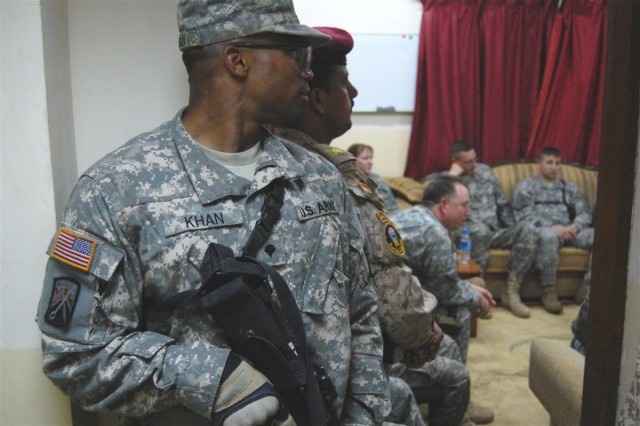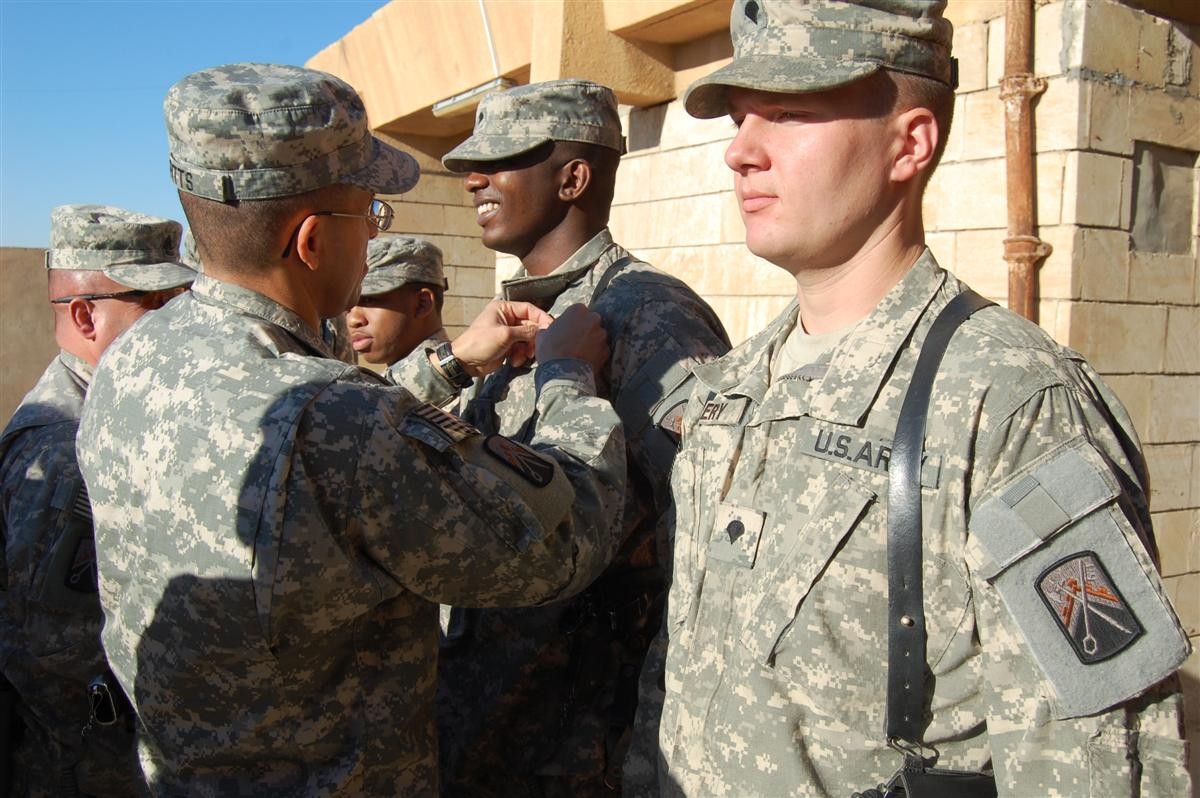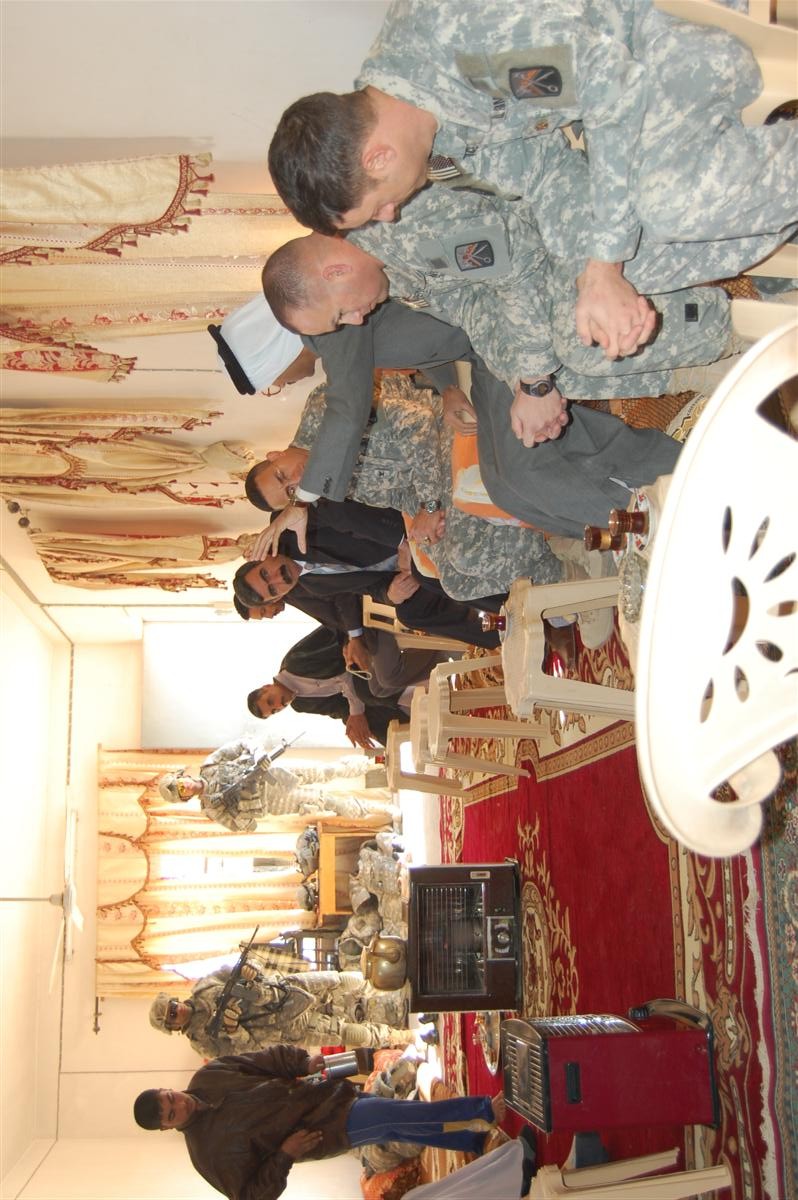CONTINGENCY OPERATING LOCATION Q-WEST, Iraq - The gray Opal flipped over twice on main supply route Tampa and came to rest on its wheels. An Iraqi woman lay on the ground next to the vehicle, her husband sitting behind it with head injuries. Villagers gathered around the vehicle, trying to help.
The Soldiers of the 16th Sustainment Brigade's personal security team were on a mission, roughly 20 miles north of Joint Base Balad, when they saw the accident.
Staff Sgt. Michael Shaw, a medic with the 16th, and Sgt. David Miller, a Sacramento, Calif. native and combat lifesaver, treated and stabilized the woman while other members of the team provided security.
"It was obvious that she sustained a head injury during the rollover, so they put a neck brace on her to prevent further damage," said Sgt.1st Class Michael Garcia, the PST's noncommissioned officer in charge. "My medics then put her on a spine board and we transported her to a nearby Iraqi police checkpoint where she could be transported to a medical facility for treatment."
The mission was one of more than 70 missions performed by the 16th Sust. Bde. PST, since they deployed in July 2008. The 23 Soldiers on the team have traveled more than 15,000 miles from Habur Gate, on the northern border of Iraq, to Victory Base Complex in Baghdad.
As their 15-month deployment comes to an end, Command Sgt. Maj. James E. Spencer, command sergeant major for the 16th, praised their efforts.
"These HOOAHs have performed exceptionally well, covering over 20,000 miles on some of the most dangerous roads of Iraq," said Spencer. "The brigade command team would not have been able to travel the battlefield and make timely decisions without this team's efforts. Bottom-line, this team has been a combat multiplier for the 16th Sustainment Brigade and our mission would have been greatly degraded without them."
The 16th, based out of Bamberg, Germany, was preparing for its 15-month deployment to Iraq, and leaders were beginning the process of building a personal security team for the brigade commander and command sergeant major.
Soldiers from different units and different vocations - welders, truck drivers, supply clerks, fuelers, radio repairers, machinists, air conditioning repairmen, mechanics and ammunition specialists - competed for slots on the brigade team.
"A sustainment brigade doesn't doctrinally have a personal security detachment assigned, so all of the Soldiers were pulled from units within the brigade, each bringing their own unique specialty to the table," said Spencer. "When forming the team, I knew it needed to be heavy with mechanical skills, but a medic, supply sergeant and a communications expert would also be critical."
Spencer issued the same warning to all Soldiers trying out for the PST in March 2008.
"I intend to put you in harm's way, five days a week," said Spencer. "If you don't want to be here, get out."
Candidates were selected in April, after a month-long training process in which only 28 of the original 40 Soldiers remained.
"The initial screening criterion was simple; a focus on the basics, which included weapons, combat lifesaver class and physical fitness proficiency," said Spencer. "Initially, I had about 40 Soldiers who competed for a spot on the team. After the first (Army physical fitness test), six-mile ruck march, IV training, range and additional weapons training, there were 28 Soldiers remaining. Eventually, 24 were selected to be on the team for the Knights' first combat operation."
The Soldiers selected were outstanding, said Garcia, a native of Davenport, Iowa.
"I think it speaks volumes that the brigade command sergeant major would select a Soldier to provide security for him and the brigade commander," said Garcia. "Let's face it; their lives are at stake when they go outside the wire."
Security operations are an opportunity for some Soldiers to refresh or improve their Soldiering skills, or to get away from routine, said Sgt. Shawn Burton, who volunteered to join the 16th's PST.
"I don't function well in the rear," said Burton, a native of Bakersfield, Calif. "I function better in a deployed environment. Things are so much simpler here."
The PST's mission is not always about security, however.
During one humanitarian mission in December 2008, PST Soldiers took time to spread some good will in Iraq, taking candy, clothes, toys and a homemade swing set to Iraqi children at a nearby village.
"The first time we went out there to Jaddilah Soflih, those kids had nothing," said Garcia. "I called my wife in Germany and told her about the kids and how I wanted to do something for them. My wife immediately started a donation box in my daughter's third grade class. Before long, the entire third grade followed suit and donated several boxes of toys and clothing."
The unit wanted to make the children smile, if only for a short time, said Sgt. Nicholas Nipitella, a PST vehicle commander.
"We did it for the kids," said Nipitella. "They don't have much and we'll do anything we can do to put a smile on their faces for a little bit."
The team has escorted several VIPs during battlefield circulation missions including Multi-National Force - Iraq Command Sgt. Maj. Lawrence Wilson.
The PST's work has saturated Iraq. Sgt. Evan Fay, vehicle operator for the brigade's command sergeant major, developed several modifications to the Mine-Resistant Ambush-Protected vehicles that have been implemented throughout MNF - I. Gen. Carter Ham, commanding general of U.S. Army Europe, visited Q-West and was given a detailed brief about some of Fay's safety and efficiency improvements to the MRAP.
"It's about improving your foxhole and thinking outside the box," said Fay, a native of Milpitas, Calif.
Training has been the driving force behind the team's success.
Prior to deployment, the PST was certified in the modern army combatives program -levels 1 and 2, combat lifesaver course, executive protection, weapons training, battle drills, convoy operations and convoy live-fire exercises.
Spc. Brandon Tillery, a native of Mount Vernon, Ill., and a PST communications specialist, is responsible for ensuring the team can communicate while on missions.
"This has been a very challenging, but fulfilling assignment for me," said Tillery. "It has given me the opportunity to do and see things that I would have never had the chance to do before I joined the team."
Spc. Jeromy Westphalen, a vehicle operator and recovery specialist, said his work allows him to uphold a promise.
"I made a promise to my grandfather about three months before he passed away," said Westphalen. "I told him that I would serve my country."
Garcia said he and his Soldiers have formed lasting bonds over the last 18 months.
"I have had the pleasure of watching these guys develop not only as a team, but into men," said Garcia. "They excel in a combat environment. If I have to leave the wire, it will be with my men."






Social Sharing